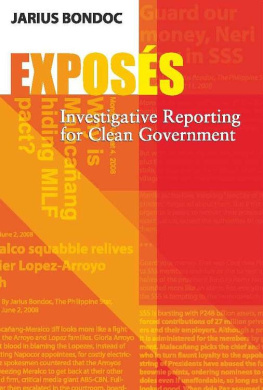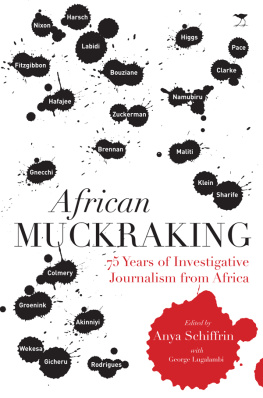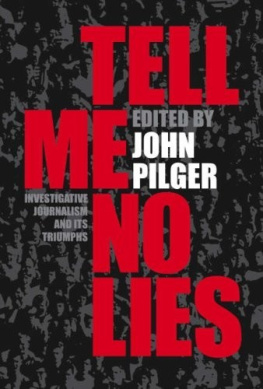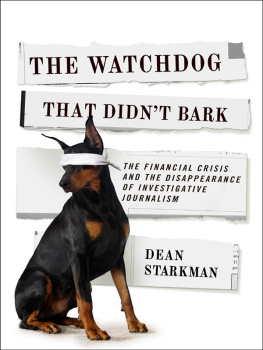Exposs
Investigative Reporting for Clean Government
Exposs
Investigative Reporting for Clean Government
Copyright to this digital edition 2012 by
Jarius Bondoc
Anvil Publishing, Inc.
All rights reserved.
No part of this book may be reproduced in any form or by any means without the written permission from the copyright owners.
Published and exclusively distributed by
ANVIL PUBLISHING, INC.
7th Floor, Quad Alpha Centrum
125 Pioneer Street, Mandaluyong City
1550 Philippines
Sales & Marketing: (632) 4774752, 4774755 to 57
Fax: (632) 7471622
www.anvilpublishing.com
ISBN 9789712727528 (e-book)
Book and Cover Design by Ibarra Crisostomo
Version 1.0.1
DEDICATION
To my wife, Marissa,
my foremost critic, editor, adviser, partner, and (believe it or not) bodyguard; and our daughter Margarita, whose growing-up years were upset many times by threats from the exposed;
and
To my many sources,
whether identified or anonymous at their request, who painstakingly explained the details and ramifications, and risked as well their jobs and personal safety.
Table of Contents
INTRODUCTION
You snickered when a generals wife recounted matter-of-factly how they routinely took travel money from military contractors. You raged against the illegal ZTE deals for the Diwalwal gold mines and a broadband network. Even if an infant when the executive scammed the NAIA-3 construction, and the legislature the pork barrel, you suffer the effects.
Those are but five of many exposs I compiled in this book. Some of you will seethingly recall or learn for the first time about the rest, like the near handover of territory to Moro separatists. Others might understand the issues better in context: e.g., how letting China explore the Philippine Sea weakened our sovereignty. Most will wonder why shenanigans, like poll rigging and vote buying, recur in much the same form and magnitude after momentary lulls. Is it because Filipinos do not learn from national experience? Or maybe, forces who resist reform simply are mightier? As Adlai Stevenson noted: Those who benefit by the vested privileges or injustices of an existing order always resent and resist change.
These exposs were first published in my column, Gotcha, in the Philippine Star. I assembled them not so much in terms of the threats of harm my family and I had to endure, but on my personal assessment of their injury to national interest. Some of the columns draw as far back as eight years ago. But after each chapter I provided some updates and outcomes. If from the general drift you notice that the whistleblowers, not the exposed grafters, ended up suffering, then that is the Philippine story. We retrogress economically, politically, and socially because we keep on putting in power the same irresponsible political class.
Coming to that conclusion was not intentional, yet inevitable. My wife and I first chose a dozen expos topics, and the most detailed columns that amplified them. Then, in editing, we pared down the topics to nine, as the publishers suggested, for easier reading. Last came the writing of updates on each issue. Although short, this was the hardest part. For it turned out that the end-result of most of the exposs was a whitewash by investigators, case weakening by prosecutors and thus dismissal by the courts, or a forgetting by the public. The book is thus an indictment of the rotten system. (I had half the mind to re-title it The Futility of Exposs. But the higher hopes prevailed of publisher Karina Bolasco and editor Carlos del Prado; thus my gratitude to them.)
When, as signs show might really happen, reinvestigations open and resume, this book hopefully will solidly foreground our knowledge of the cases. Whatever new revelations or findings may come up regarding these cases, from new evidence or testimonies, they can, and will, only be fully appreciated and weighed against what have been established in this book.
Moreso there is urgency and currency in this compilation by a frustrated geezer. It can give insights to a better next generation of whistleblowers and exposers. The trend need not always be, The more things change, the more they remain the same. In future, somethings gotta give, and good must overcome evil.
Let us help shape that generation and that future for the sake of the Filipino.
Jarius Bondoc
December 2011
NBNZTE
March 30, 2007
When agencies break rules, public suffers
T he National Broadband Network (NBN) would hew together governments landline, cellular, and Internet infrastructure. Administrations have long dreamed of it, and launched three smaller but failed types: Telecom Office, Municipal Telephone Public-Calling Office, Telepono sa Barangay. Enter Amsterdam Holdings Inc. (AHI), proposing to take over the work from the Dept. of Transportation and Communication (DOTC), and erect a bigger one. AHIs Orion Project directly would interconnect all provincial capitols, city halls, and first- and second-class municipios. Geared to support health and education, it would cover all state colleges, half of public high schools and hospitals, and most private hospitals. Wireless service also would be given to 1,203 national agencies and state firms, 2,000 post offices, 350 state colleges, 2,643 high schools, 200 hospitals, 117 city halls, 41 provincial capitols, 465 municipios, and 5,000 barangay halls.
All this AHI promised to build in four years for $240 million under a build-own-operate scheme, as stated in the Build-Operate-Transfer (B-O-T) Law.
In the unsolicited proposal of Dec. 5, 2006, AHI pledged to bill government a percentage below the lowest rate of local telecom firms: 5070 per call. This would cut by a fourth the P3.5 billion that government spends on calls yearly. All AHI needs is an assurance of executive performance, as stated in the B-O-T Law, that government would use half of Orions capacity. The other half would be sold to private users to subsidize the discounted government rate.
Under the law, DOTC must start studying the unsolicited proposal within 60 days. Then, it must submit the papers to the National Economic and Development Authority (NEDA), for a Swiss challenge, which basically opens the bidding to other businesses to match the price set by AHI. Seventy-five days from receiving AHIs papers, DOTC has not moved. Worse, it accepted another unsolicited bid, prohibited under the B-O-T Law, from a Chinese firm.
The new proposal, from ZTE Group, offers a government-to-government loan, which in turn would require a sovereign guarantee of repayment. The B-O-T Law forbids so in unsolicited proposals. The ZTE plan is only to erect the broadband facility then let DOTC run it. This runs counter to government policy of privatizing its telecom assets. ZTEs price is even higher, $262 million, and would take longer to finish. Yet DOTC is rushing to endorse it to NEDA.
On Mar. 18, 2007, AHI filed a complaint to DOTC Secretary Leandro Mendoza, who was supposed to respond within a period of 15 days. There was no reply.













